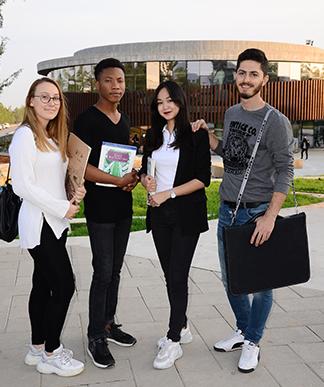


About the Program
Clinical psychology is a field that is growing rapidly in the field of health sciences and has a high demand rate in the field. It is an area that is needed by many sectors in line with the increasing population and the problems experienced by this population. Given the large number of data, it seems urgent to overcome the need for a 'specialist clinical psychologist'. Unfortunately, the number of clinical psychologists who have received expertise in this area according to international academic and practical training criteria is far from meeting the needs of the field. The Clinical Psychology Program of our university aims to train professionals who will work primarily in this sensitive direction. Program with Project is completed in two academic terms, and the program with thesis is completed in four academic terms. Courses are offered jointly in both programs, and only the project and thesis courses differ. In the non-thesis and thesis program, in addition to theoretical and applied field courses, elective courses are also offered.
Education Opportunities
The master’s degree in clinical psychology is based on the principles of the Boulder Conference, which sheds light on the training of clinicians. In accordance with these principles, the program is an equal combination of learning, scientific study and clinical practice. This offers an ideal setting to help students gain clinical competence and help to train expert clinical psychologists with advanced theoretical knowledge and practical skills. In addition, while clinical contributions are made through the clinical projects prepared under the supervision of professionals; there are also clinical practices that are supervised and observed by professionals. This graduate program is suitable for the individuals with a bachelor's degree in Psychology and Guidance and Psychological Counselling (with the condition of scientific preparation for a year) who want to work, teach, research and help with social care of individuals with mental and / or emotional problems in clinical settings. For this reason, the structure of our program focuses on strengthening the theoretical knowledge and practical skills (intelligence and personality tests, interviewing techniques, psychotherapies and research techniques) that the field professionals would need. The vision of the CIU master's program in Clinical Psychology is to become a nationally recognized leader in education and to learn and develop the scientific principles of behavior and mental processes in cooperation with its employees and students; to contribute to the science of psychology and its practices; and to produce professionals serving local, national and global communities.

Career Areas
The program provides the basis for the scientific understanding of behavior and mental processes, the establishment of psychopathological situations and psychotherapy-based treatment, and the promotion of service. Our graduate program aims to prepare students as Licensed Clinical Psychologists who provide evidence-based services for children, adults and families in various health and education settings. In this context, graduates of the Clinical Psychology Master’s Program work as psychologists at schools, kindergartens, hospitals, nursing homes, prisons, correctional facilities as specialists; or instructors and academic members at universities; as well as officials at public and private institutions and organizations.
Contact
Institute of Graduate Studies and Research
Graduate Sciences and Education Center, GE106
Tel: +90 392 671 1111 Extension: 2776
Institute E-mail: ciu-institute@ciu.edu.tr
Compulsory Courses
First Semester
ADVANCED PSYCHOPATHOLOGY
Course code
PSKO503Credit
3Theoretical
3Practical
0Ects
8ADVANCED PSYCHOTHERAPY THEORIES AND TECHNIQUES
Course code
PSKO504Credit
3Theoretical
3Practical
0Ects
8THE FIRST INTERVIEW-I
Course code
PSKO506Credit
3Theoretical
3Practical
0Ects
8ELECTIVE
Course code
PSKOXX1Credit
3Theoretical
3Practical
0Ects
6Second Semester
RESEARCH AND ANALYSIS
Course code
FEED520Credit
3Theoretical
3Practical
0Ects
7THESIS
Course code
PSKO500Credit
0Theoretical
0Practical
0Ects
60APPLICATION AND SUPERVISION -I
Course code
PSKO512Credit
3Theoretical
3Practical
0Ects
8SEMINAR
Course code
PSKO590Credit
0Theoretical
0Practical
0Ects
3ELECTIVE
Course code
PSKOXX2Credit
3Theoretical
3Practical
0Ects
6ELECTIVE
Course code
PSKOXX3Credit
3Theoretical
3Practical
0Ects
6Elective Courses
Students who are interested in pursuing advanced graduate studies leading to a master’s, doctoral degree, or professional doctorate degree for the Fall and Spring semesters every year. Applicants can directly apply online to our graduate programs using the application portal.
TR Applicants- Required documents:
- Bachelor’s Degree Diploma
- Bachelor’s Degree transcripts for each completed academic term/year.
- Valid ALES result document (must not exceed 5 years),
- Documents to prove English proficiency for English language departments,
- Scanned copy of passport or identity card.
Click for detailed admission requirements information.
Students who are interested in pursuing advanced graduate studies leading to a master’s, doctoral degree, or professional doctorate degree for the Fall and Spring semesters every year. Applicants can directly apply online to our graduate programs using the application portal.
TRNC Applicants- Required documents:
- Bachelor’s Degree Diploma
- Bachelor’s Degree transcripts for each completed academic term/year.
- Documents to prove English proficiency for English language departments,
- Scanned copy of passport or identity card.
Click for detailed admission requirements information.
| Fee per course | € 420,00 |
| Fee for thesis | € 1.260,00 |
| Fee for seminar | € 120,00 |
| Scientific Foundation per course | € 150,00 |
| Annual Registration Fee | € 295,00 |
| VAT Exc. |